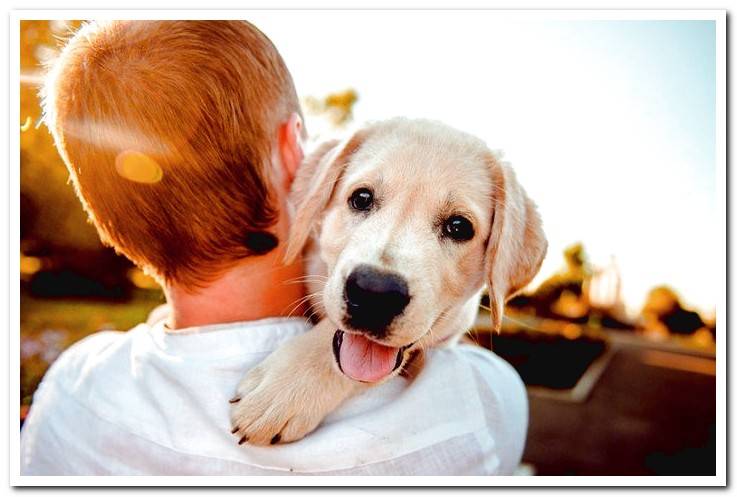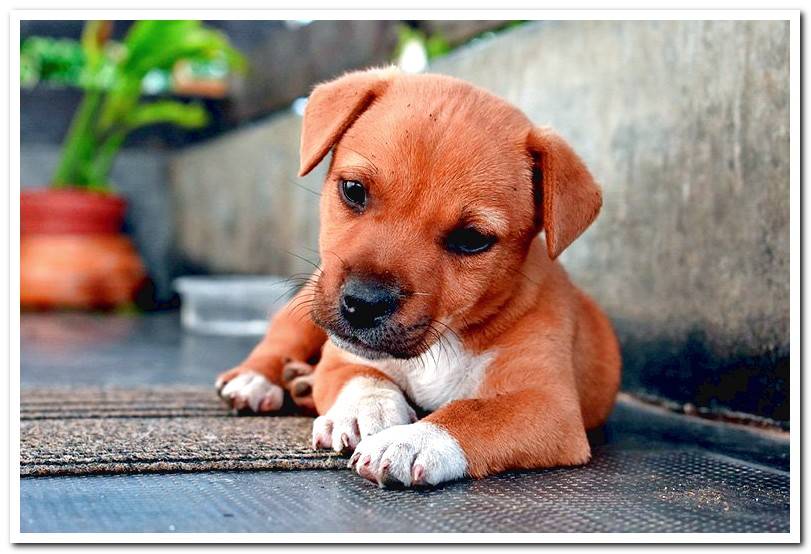
It is not strange that we cross the street with puppies of just a few weeks of life taking a walk. Although veterinaryns report the dangers of exposing these little ones without vaccination, the importance of this recommendation does not end.
Without the protection of vaccines, dogs are exposed to infectious diseases. Many of them are so serious that few puppies manage to overcome them. At this delicate stage we must combine socialization with protection.
Index of contents
- 1 Puppy adoption
- 2 The importance of vaccines
- 3 Diseases that a puppy can get on the street
- 4 Parasites that a puppy can catch on the street
- 5 Socialize vs protect
Puppy adoption
First of all, there is no need to remember that puppies are not toys. This means that the fundamental thing is to respect their needs. And the main one is to stay with his mother and brothers for at least eight weeks.
It is important because during that time the puppy must drink breast milk, even though with three weeks already begin to try solid foods. Their mother’s milk, especially the initial colostrum, provides the little ones, with a still immature immune system, antibodies and defenses against disease.
Furthermore, this is a very delicate period on a psychological level. The puppy’s socialization at this stage must have the presence of his family. With this we avoid behavioral problems in the future.
The importance of vaccines
Vaccines contain a small amount of a pathogen, which is usually inactivated. By giving a vaccine we are presenting a disease to the dog. In this way, your immune system detects the pathology against which you have been vaccinated and which, due to its treatment, cannot trigger the disease, and creates antibodies against it.
Thus, if it naturally comes into contact with this pathology, the dog will already have defenses prepared to combat it. Otherwise, being such serious diseases, the puppy can die before his body reacts. In general, the first vaccines are given around eight weeks of age.
But a single dose does not come. Therefore, vaccines are repeated. The veterinaryn, depending on the characteristics of the puppy and its living conditions, will advise us on the most suitable vaccination schedule for him. Puppy vaccinations usually end around twelve weeks. Without all the doses, we cannot take it out on the street.
Diseases that a puppy can get on the street
Many of the highly contagious pathologies are due to viruses that manage to survive in the environment even for months. Sick dogs often eliminate viruses in their secretions. Other dogs can be spread by coming in contact with them. They do not need to lick or ingest anything.
Only by sniffing, for example, urine, a very common behavior in dogs, can transmission occur. These diseases have a high mortality, which is going to shoot in a puppy without vaccination. These little ones have neither protection nor an immune system mature enough to effectively fight the virus.
It must be remembered that when faced with viral diseases, there is no other treatment than support. There is no drug that can be given to cure the dog. This makes this type of pathologies especially dangerous. We are talking, for example, parvovirus or distemper.
- Canine Parvovirus Information
- How does distemper affect a dog?

Parasites that a puppy can catch on the street
On the other hand, intestinal parasites are also highly resistant in the environment. Puppies, just like they need more than a shot, they must also be dewormed more frequently during their first months of life.
Although intestinal parasites do not usually cause any disorder in healthy adult dogs, in puppies they can be so dangerous that they even end up killing the little one. In them the parasites are capable of causing severe anemia, in addition to diarrhea and vomiting, malnutrition or growth problems.
There is more risk when the puppy is stressed by the change of home, comes from somewhere with poor hygienic conditions, has been weaned suddenly, etc. An example is nematodes. Of course, on the street the puppy can also get ticks, fleas, or even lice.
- Internal parasites in puppies What are they and how do they affect a puppy?

Socialize vs protect
As important as taking care of our puppy’s health by preventing it from taking to the streets too soon is offering it adequate socialization. This implies relating it to other people, other animals, people and exposing it to different environments and situations.
But how can we do it if we cannot take the puppy out for weeks because it is dangerous? Here are some practical ideas to combine socialization and safety while the vaccination schedule is not completed:
- We can walk with the puppy in our arms as long as the weather is mild and we do not allow it to contact unknown dogs.
- Another option is to take the little one to the house of a friend who has a healthy, perfectly vaccinated and dewormed dog.
- We can also receive canine visits that meet the above requirements.
- The puppy can leave if we have a garden, a terrace, a patio or a farm that other dogs cannot access.
- It is a good idea to start getting used to car travel, always starting with very short trips.
- Finally, in some veterinary clinics activities are organized with puppies in which they will be able to interact with each other safely, since the vet will supervise which dogs are suitable to participate. In addition, they usually include basic education classes so that we begin to teach our puppy.
